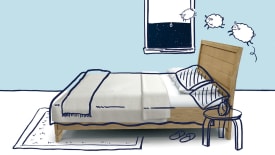Smarter: The Most Unexpected Causes of Home Fires

This week I’m stopping you from committing a fire safety blunder that might cost you dearly. Also in this issue: Does bread lead to weight gain, and how to get rid of that stinky smell coming from your car’s air conditioning.
THE BIG STORY:
‘Too Few Cooks in the Kitchen’When I was growing up, my father was obsessed with fire safety. Every time we left our apartment, he would check to see if the stove was on.
He also spoke frequently about the dangers of home fires. I may be the writer in the family, but he was the master storyteller when it came to the horrors of the hearth, describing with morbid matter-of-factness fires that could spread through homes in a matter of minutes and leave people injured and dead and all their possessions burnt to a crisp.
I think it’s because of him that I’ve always been slightly fearful of fires, and for good reason. In 2020, the rate of deaths per 1,000 home fires has stayed around the same as it was in 1980, even though the number of fires in the U.S. has dropped by around 50 percent compared with 1980.
To help identify fire safety problems people might be unaware of, here’s a rundown of some of the leading causes of home fires, as well as a few surprising ones.
DOUBLING DOWN
We asked dozens of CR members to test out their fire extinguishers at home. Around half of the extinguishers were 20 or more years old, and a few didn’t work at all, as you can see in the video below.
One of the significant facets of fire safety protection is to remember to replace your fire extinguishers, which typically have a maximum life span of 12 years.
For advice on where to store your fire extinguisher in your home and where not to, like right next to your stove, read here.
QUIZ
Myth or truth: Eating bread leads to weight gain.
(The answer’s at the end.)
ASK AN EXPERT
Question:
Is there any way to stop bug bites from itching? I get bites when I’m working in the vegetable garden, and sometimes they itch for days.
Answer:
Bug itches are truly the worst. Here are a couple of things you can try: First apply an ice pack or cool compress to the area where it itches. Calamine lotion is also helpful, and an over-the-counter steroid cream like hydrocortisone is super-effective for easing itches, says Paul Hope, a CR home and appliances writer who has written about how to get rid of mosquitoes.
And if all these things don’t work, you can take an over-the-counter oral antihistamine.
Have any questions for our experts? Ask us anything.
THE GOOD STUFF
These are the cars that are the most expensive to gas up.
MUST-READS OF THE WEEK
🙅 4 Medical Treatments That Are Sometimes Unnecessary
Stenting and spinal fusions are overused.
☕ Secrets to Making a Great Latte at Home
An anonymous tester of major coffee brands weighs in.
🤢 How to Get Rid of the Musty Smell From Your Car’s Air Conditioning
Why does the smell of a sweaty sock come out of the vents when the AC is turned on?
Here are the top models rated by us and some to avoid.
TECH SUPPORT
Here’s one thing CR technology writer Thomas Germain, who writes frequently about digital privacy, would never do: skip software and firmware updates.
Why? Because these updates on your phone and computer often include important patches to security problems, and if you ignore them, you can become more vulnerable to cyberattacks. Here are four other things Thomas says you should stop doing.
QUIZ ANSWER
The answer is bread doesn’t necessarily cause weight gain. While there is some research that shows that white bread might lead to the widening of a waistline, whole-grain bread seems less likely to spur weight gain.

"We have a code bread situation."
















